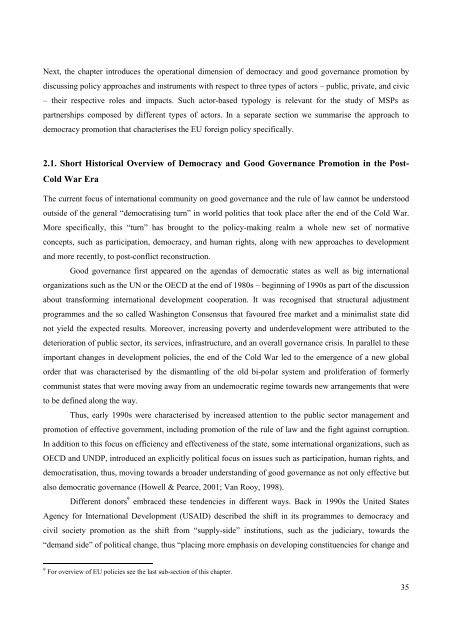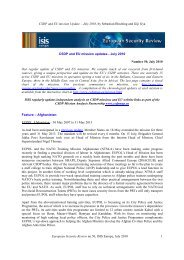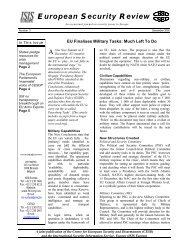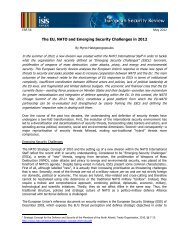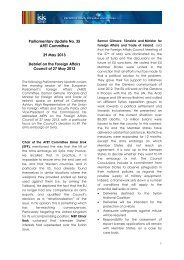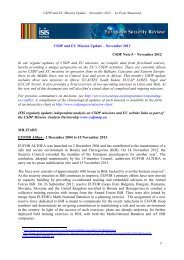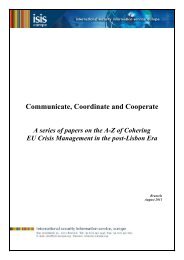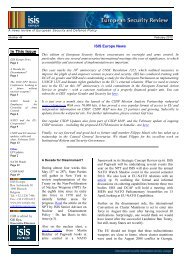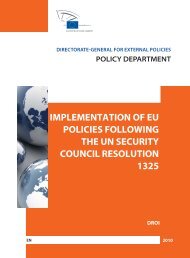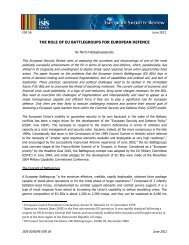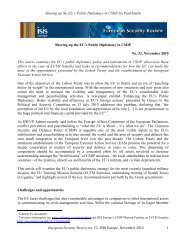Multipart thematic paper on multi-stakeholder ... - ISIS Europe
Multipart thematic paper on multi-stakeholder ... - ISIS Europe
Multipart thematic paper on multi-stakeholder ... - ISIS Europe
You also want an ePaper? Increase the reach of your titles
YUMPU automatically turns print PDFs into web optimized ePapers that Google loves.
Next, the chapter introduces the operati<strong>on</strong>al dimensi<strong>on</strong> of democracy and good governance promoti<strong>on</strong> by<br />
discussing policy approaches and instruments with respect to three types of actors – public, private, and civic<br />
– their respective roles and impacts. Such actor-based typology is relevant for the study of MSPs as<br />
partnerships composed by different types of actors. In a separate secti<strong>on</strong> we summarise the approach to<br />
democracy promoti<strong>on</strong> that characterises the EU foreign policy specifically.<br />
2.1. Short Historical Overview of Democracy and Good Governance Promoti<strong>on</strong> in the Post-<br />
Cold War Era<br />
The current focus of internati<strong>on</strong>al community <strong>on</strong> good governance and the rule of law cannot be understood<br />
outside of the general “democratising turn” in world politics that took place after the end of the Cold War.<br />
More specifically, this “turn” has brought to the policy-making realm a whole new set of normative<br />
c<strong>on</strong>cepts, such as participati<strong>on</strong>, democracy, and human rights, al<strong>on</strong>g with new approaches to development<br />
and more recently, to post-c<strong>on</strong>flict rec<strong>on</strong>structi<strong>on</strong>.<br />
Good governance first appeared <strong>on</strong> the agendas of democratic states as well as big internati<strong>on</strong>al<br />
organizati<strong>on</strong>s such as the UN or the OECD at the end of 1980s – beginning of 1990s as part of the discussi<strong>on</strong><br />
about transforming internati<strong>on</strong>al development cooperati<strong>on</strong>. It was recognised that structural adjustment<br />
programmes and the so called Washingt<strong>on</strong> C<strong>on</strong>sensus that favoured free market and a minimalist state did<br />
not yield the expected results. Moreover, increasing poverty and underdevelopment were attributed to the<br />
deteriorati<strong>on</strong> of public sector, its services, infrastructure, and an overall governance crisis. In parallel to these<br />
important changes in development policies, the end of the Cold War led to the emergence of a new global<br />
order that was characterised by the dismantling of the old bi-polar system and proliferati<strong>on</strong> of formerly<br />
communist states that were moving away from an undemocratic regime towards new arrangements that were<br />
to be defined al<strong>on</strong>g the way.<br />
Thus, early 1990s were characterised by increased attenti<strong>on</strong> to the public sector management and<br />
promoti<strong>on</strong> of effective government, including promoti<strong>on</strong> of the rule of law and the fight against corrupti<strong>on</strong>.<br />
In additi<strong>on</strong> to this focus <strong>on</strong> efficiency and effectiveness of the state, some internati<strong>on</strong>al organizati<strong>on</strong>s, such as<br />
OECD and UNDP, introduced an explicitly political focus <strong>on</strong> issues such as participati<strong>on</strong>, human rights, and<br />
democratisati<strong>on</strong>, thus, moving towards a broader understanding of good governance as not <strong>on</strong>ly effective but<br />
also democratic governance (Howell & Pearce, 2001; Van Rooy, 1998).<br />
Different d<strong>on</strong>ors 9 embraced these tendencies in different ways. Back in 1990s the United States<br />
Agency for Internati<strong>on</strong>al Development (USAID) described the shift in its programmes to democracy and<br />
civil society promoti<strong>on</strong> as the shift from “supply-side” instituti<strong>on</strong>s, such as the judiciary, towards the<br />
“demand side” of political change, thus “placing more emphasis <strong>on</strong> developing c<strong>on</strong>stituencies for change and<br />
9 For overview of EU policies see the last sub-secti<strong>on</strong> of this chapter.<br />
35


